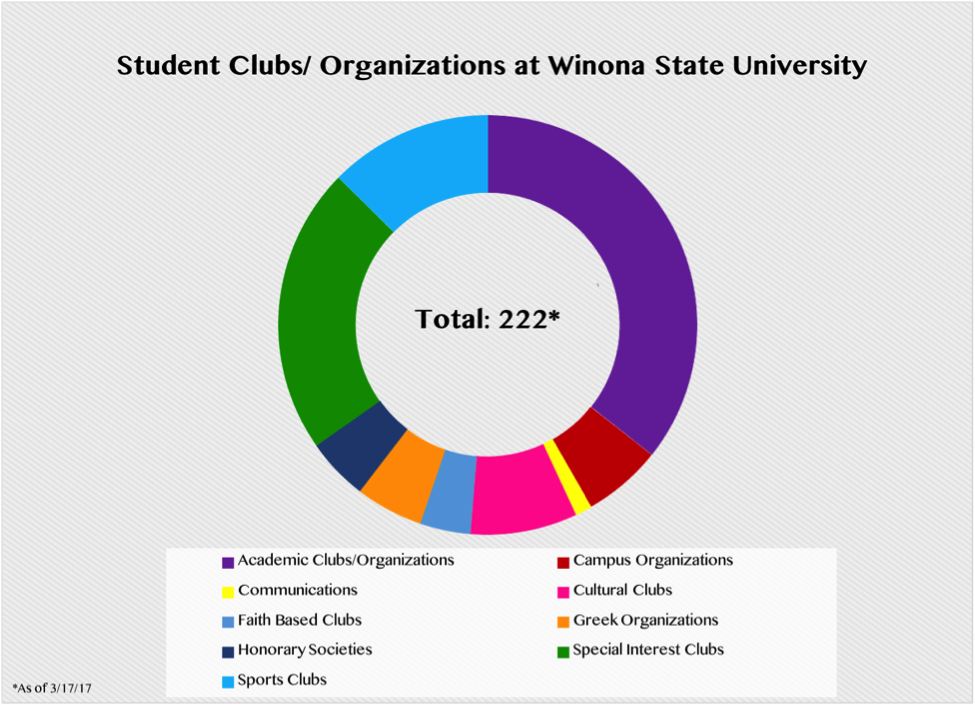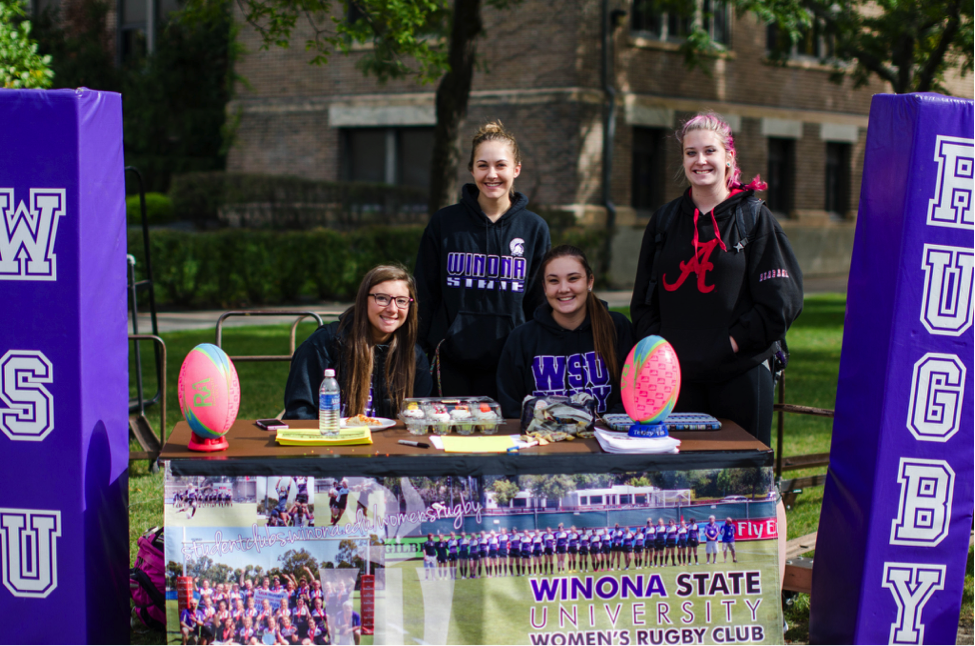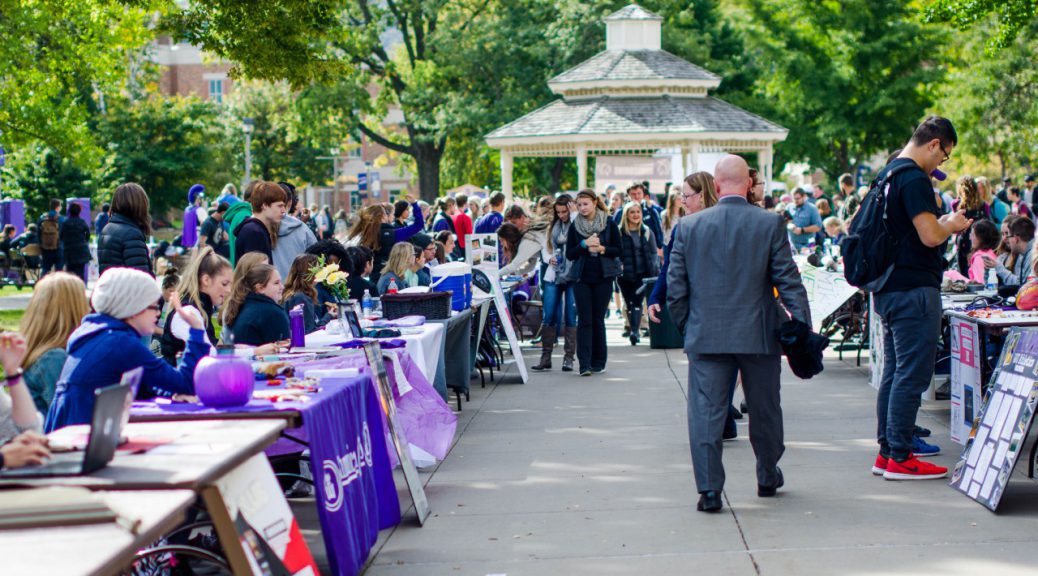by Allison Mueller and Elizabeth Pulanco
Eager students, colorful posters and free treats are at the forefront of every Winona State University club fair. These attractions, along with inviting games and cute animals, often lure students to tables — a tactic clubs use every year.
At a club fair, group members are present and strive to attract new recruits for two reasons: it is mandatory and necessary to avoid termination.
Winona State lists specific requirements for creating and maintaining official club or organization status. This includes having at least 10 student members, an updated roster and constitution, and participation in the fall club fair.
Joe Reed, Winona State’s Student Union director said the first and most important step in creating a club is the Student Senate approved constitution, which is often resubmitted if changes need to be made. This constitution must include at least one purpose of the club and membership, meeting and funding requirements.
“The key element is to have the constitution approved by Student Senate,” Reed said. “If you are recognized by Student Senate, you’re a club. This is usually the first step when creating the club.”
Reed has been working with student clubs and organizations at Winona State since 1989. During his time at the university, the number of clubs has increased from 85 to 222. Reed said growing numbers could be attributed to interest in more athletic and academic based clubs.
Both Reed and Tracy Rahim, associate director of Student Activities & Leadership, work closely with clubs and organizations. At the beginning of the academic year, they have to educate new club leaders.
“We have a lot of the same issues every year because we have to reinvent the wheel. You have new officers and there is a lot to learn. It keeps evolving and we are here to keep it going,” Reed said. “Tracy keeps everyone in check.”
With 222 clubs in Winona State’s directory, the Alliance of Student Organizations oversees all these organizations and removes inactive clubs from the list. According to ASO Director Megan Grochowski, nearly 30 clubs have been removed from the directory since she assumed her student position in fall 2016. She said she receives two or three requests a week for the creation of new clubs.

Reed said the best way to maintain a club after its creation is to continue recruiting members, which is why club fairs are hosted several times a year.
“One of the biggest things I see, is when unique clubs start, they have what we call their ‘founding fathers,’ or their founding students graduate and don’t recruit. The next thing you know, the club kind of fades away,” Reed said. “A good example of this is a black fraternity we had. They were all upperclassmen and they graduated and then it just died, which was sad to see. It was called Phi Beta Sigma.”
Julie Schaefer and Madeline Sundheim, co-presidents of the Student Council for Exceptional Children, a student club that advocates for children with disabilities, have been working to prevent this from happening to their club.
In addition to attending the club fairs hosted during the year, Sundheim said the club stops by special education classes to get the word out about their club and recruit students.
“We also stop by the teacher induction ceremonies and speak about our club,” Sundheim said.
The club provides officers with binders including old events and contact information so new officers will have an idea about what it takes to set up a club event.
Despite different recruiting methods, Schaefer and Sundheim discovered how the nature of their club has prevented potential members from committing.
“When people hear what we do, the whole disability part of it turns people away,” Schaefer said. “I have heard people say that they don’t know how to go and work with people who have disabilities, but we go over that in the club and for a lot of our events we have club training which covers the basics, like ‘if this happens, this is what you do.’”
Since the club works with children who have disabilities, most members are special education majors. Sundheim said the group has a difficult time recruiting different majors, because people assume it is a club for only special education majors.
“When they hear that we work with people who have disabilities, they automatically assume that it is for special education majors, but it is open to all majors,” Sundheim said. “We have a business major in the club right now.”
While working with fellow members, clubs and organizations are overseen by the ASO. As director, Grochowski serves as a liaison between ASO and Student Senate, and said she applied for the position after the previous director resigned.
“At first I was hesitant to apply, but I also saw how much leadership ASO lacked. I really wanted to do something to step up and enforce the rules and all the policies clubs need to follow,” Grochowski said.
Grochowski and her judicial committee makes sure clubs follow policies to become a club and maintain active status. She explained the ASO reviews the entire directory, clicking on every club listed to see when constitutions and rosters were last updated. Grochowski said if clubs do not comply, she emails the advisor and student leader as many as five times to ensure they are inactive before terminating the club.
“We have faced some backlash with this process, but it goes to show that people need to be a little more responsible with clubs, and it comes with some repercussions,” Grochowski said.
All clubs at Winona State are able to request funding each year based on the age of the club. A club in its first year of operation can receive up to $500, its second year up to $1,000 and up to $1,500 in its third year.
Grochowski said this money system leads to tough decisions and ultimately angry club members.
“If you’re deleted from the directory, you go back down to $500. If you were actually an active club and were deleted, you’d have to reapply and be considered a new club,” Grochowski said. “Clubs need to follow these rules and to show we are enforcing them now and mean business, we had to make those tough decisions.”
Three mandatory ASO meetings are held per semester to convey important club information and updates. Grochowski said these gatherings can be tedious for ASO and clubs, especially when there is not a lot of information to convey and can be done via email.
“It’s frustrating for me and an inconvenience for the students if the meeting’s only five to 10 minutes long. But they’re mandatory so I have to put them on,” Grochowski said.
Student Senate Treasurer Duc Nguyen holds treasurer workshops during ASO meetings every semester. He said at these workshops he outlines a guide he created that explains what happens from when a club decides it needs money, to when that money is processed. Nguyen said he receives around 10 emails a week from students asking questions he already covered in the treasurer workshop.
“I don’t know if they weren’t paying attention and I don’t blame them – my workshops aren’t exactly all that exciting, but a lot of them are asking the most basic question: we only need this amount, but where do we go for it?,” Nguyen said.
Amy Scherer is the new treasurer for Winona State women’s rugby, recognized as a sports club. She said the treasurer workshops she has attended have been especially informative on the club reimbursement process.
“I like that [the ASO] reaches out to club presidents and treasurers and inform them on how their processes work,” Scherer said. “To me, this shows that they appreciate their clubs and want them to continue doing what they’re doing.”
According to Grochowski, if a representative from a club does not show up to an ASO meeting that club is put on temporary suspension until they meet with her. This suspension includes a freeze on Student Activity Fund (SAF) allocations to that organization.
Grochowski said, “We did have one club that did not attend one of the meetings and they had requested funding for a big trip, and they couldn’t get the funding right away because of that. It gets people to follow the rules.”
Nguyen also explained the importance of clubs completing a required Semester Financial Review (SFR). This completed form documents money given to a club by either the Student Activity Fund Committee (SAFC) or Student Senate. He said failure to submit this form at the end of a semester will also result in the freezing of a club’s funds and potentially deletion from the directory.
The SAFC is responsible for distributing money to clubs who have submitted online funding request forms. The small committee is made up of about five student senators, including Nguyen as chair. He said the committee reviews and votes on requests for less than $1,500 and are subject to SAF rules written by Senate, while Senate’s money is bound by Minnesota State laws.
Nguyen said, “The rules are really picky, so there’s not much leniency. Clubs come to my committee, SAFC, only when they need something small and what everyone gets, such as needing money for T-shirts or things within Winona boundaries.”
SAFC receives around 20 funding requests a week, according to Nguyen. After review, five or 10 of these are funded. While money is available to clubs through the SAFC, he said it is more of a cap rather than an entitled amount, and Senate prefers clubs do not reach the allowed amount.
“When we went into this school year we had around 200 clubs and $154,000 total between SAFC and Senate. The math doesn’t add up,” Nguyen said. “If every club got whatever they’re capped at, we’d be over the limit so many times.”
In addition to ASO, the Sports Club Council oversees sports clubs on campus. It provides a similar list of club requirements, adding the completion of designated community service days and fundraising events, as well as a yearly base monetary allocation. Its tier system dictates requirements for teams, categorizing them as either Virtual Varsity, Competitive I and Competitive II.
Scherer said women’s rugby, since they have 20+ players and a national title, receive $6,000 yearly as a Virtual Varsity team.
“Since we are a traveling sports club, we take advantage of this eligibility and often use all of it,” Scherer said. “We use it for reimbursement on gas, sports equipment, motels and bus rentals.”

Whether it is a sports club or the Student Council for Exceptional Children, every club is required to follow procedures. Grochowski said moving forward, the ASO needs to be more strict with these rules and clubs need to follow them closer in order to maintain active status.
Club longevity involves more than following rules and guidelines. Motivated leaders and cooperative members provide knowledge and opportunities to keep a club running for years.
Rahim said, “It is really about how self-directed [clubs] are and if they give themselves the opportunity to create a presence on campus that is going to maintain their livelihood.”
